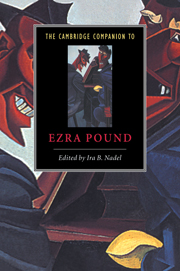Book contents
- Frontmatter
- 1 Introduction Understanding Pound
- 2 Pound and the making of modernism
- 3 Early poetry 1908-1920
- 4 Early Cantos I-XLI
- 5 Middle Cantos XLII-LXXI
- 6 Late Cantos LXXII-CXVII
- 7 Beyond The Cantos
- 8 The texts of The Cantos
- 9 Pound as critic
- 10 Pound as translator
- 11 Pound and the visual arts
- 12 Pound and music
- 13 Pound's politics and economics
- 14 Pound, women and gender
- 15 Pound and antisemitism
- Further reading
- Index
8 - The texts of The Cantos
Published online by Cambridge University Press: 28 May 2006
- Frontmatter
- 1 Introduction Understanding Pound
- 2 Pound and the making of modernism
- 3 Early poetry 1908-1920
- 4 Early Cantos I-XLI
- 5 Middle Cantos XLII-LXXI
- 6 Late Cantos LXXII-CXVII
- 7 Beyond The Cantos
- 8 The texts of The Cantos
- 9 Pound as critic
- 10 Pound as translator
- 11 Pound and the visual arts
- 12 Pound and music
- 13 Pound's politics and economics
- 14 Pound, women and gender
- 15 Pound and antisemitism
- Further reading
- Index
Summary
Our general understanding of textual criticism, its aims and procedures, has changed rather dramatically over the past twenty years or so, and it is no longer possible to consider the texts of The Cantos, or of any other major modernist work, without first reviewing, at least in outline form, relevant theoretical perspectives. Earlier views held that authors are isolated, unified, and integral personalities, and that they naturally work toward the creation of an end-product. In fact, no one lives in total isolation as a self-contained and consistent integer. Writers normally exist in a world of friends and family, as well as of colleagues and business associates. It is also difficult to assume that they never change their minds or points of view. More importantly, authors are in constant contact with literary tradition, the innumerable works of existing literature which form and influence them, not to mention their experience of both current and historical events.
Of course, writers set out to produce poems, novels, plays, etc., but there are two possible models for the process. The first contends that the most important moment in the creative process is the initial flash of inspiration and that subsequent rewriting, the working-out of an idea into final form, compromises the tension which gave birth to the work by moving further and further away from it, perhaps even censoring or repressing it.
- Type
- Chapter
- Information
- The Cambridge Companion to Ezra Pound , pp. 161 - 187Publisher: Cambridge University PressPrint publication year: 1999
- 2
- Cited by



